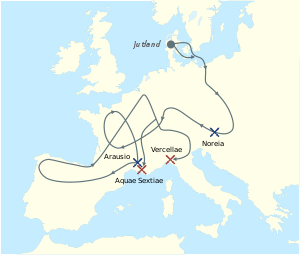
Back حرب كيمبريان Arabic Кимврийска война Bulgarian Guerra címbria Catalan Kimbrertoget Danish Kimbernkriege German Guerra cimbria Spanish جنگ کیمبری Persian Kimbrisota Finnish Guerre des Cimbres French מלחמת הקימברים והטווטונים HE
| Cimbrian War | |||||||
|---|---|---|---|---|---|---|---|
 Supposed migrations of the Cimbri and the Teutons: | |||||||
| |||||||
| Belligerents | |||||||
|
Roman Republic Celtiberians |
Cimbri Teutones Ambrones Tigurini | ||||||
| Commanders and leaders | |||||||
|
Gaius Marius Quintus Lutatius Catulus Quintus Servilius Caepio Gnaeus Mallius Maximus Gnaeus Papirius Carbo Lucius Cassius Longinus † Lucius Calpurnius Piso † Marcus Junius Silanus |
Boiorix † (Cimbri) Lugius † (Cimbri) Claodicus Caesorix Divico (Tigurini) Teutobod | ||||||
The Cimbrian or Cimbric War (113–101 BC) was fought between the Roman Republic and the Germanic and Celtic tribes of the Cimbri and the Teutons, Ambrones and Tigurini, who migrated from the Jutland peninsula into Roman-controlled territory, and clashed with Rome and her allies. The Cimbrian War was the first time since the Second Punic War that Italia and Rome itself had been seriously threatened.
The timing of the war had a great effect on the internal politics of Rome, and the organization of its military. The war contributed greatly to the political career of Gaius Marius, whose consulships and political conflicts challenged many of the Roman Republic's political institutions and customs of the time. The Cimbrian threat, along with the Jugurthine War, allegedly inspired the putative Marian reforms of the Roman legions, a view now contested by modern historians.
Rome was finally victorious, and its Germanic adversaries, who had inflicted on the Roman armies the heaviest losses that they had suffered since the Second Punic War, with victories at the battles of Arausio and Noreia, were left almost completely annihilated after Roman victories at Aquae Sextiae and Vercellae. Some of the surviving captives are reported to have been among the rebelling gladiators during the Third Servile War.[1]
- ^ Strauss, Barry (2009). The Spartacus War. Simon and Schuster. pp. 21–22. ISBN 978-1-4165-3205-7.
marius german.